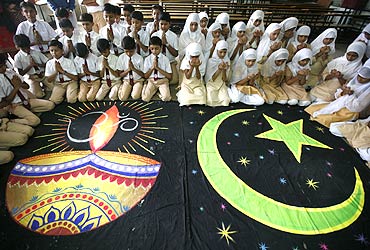
Sheela Bhatt speaks to Muslim leaders to plumb the emotions in the community after the court verdict in the Ayodhya title suit
As the fallout of the Ayodhya judgment starts to sink in, leaders of the Muslim community are debating over taking a historical and radical decision.
Two members of the All India Muslim Personal Law Board gave this indication while speaking to rediff.com. They said Muslims are feeling uncomfortable about keeping the one-third of the plot awarded to them by the Lucknow bench of the Allahabad high court, "as if some kind of charity is being done to the community".
Asaduddin Owaisi, a barrister trained in London and president of All India Majlis-e-Ittehadul Muslimeen, a Muslim political party, is a prominent member of the Lok Sabha and a member of the AIMPLB. He told rediff.com, "When my title suit is rejected by the honourable court why am I given charity? Take this bloody thing back! Why should I get that chunk of land which is legally not in my name? Why are you patronising me? Why? Either give back my entire land over which the mosque stood or take away the whole of the land that is not mine legally. I don't see how I can have a right over it! Under the law of Waqf I can't accept that land."
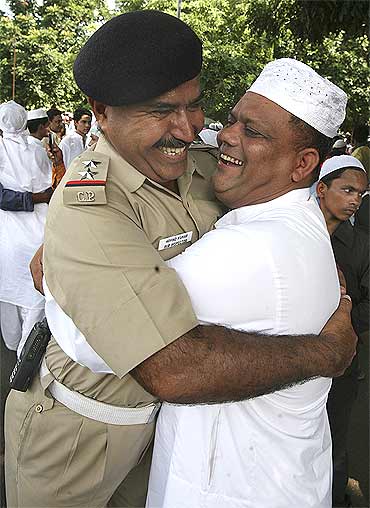
However, there are leaders influenced by the Congress who want to hold on to any knee-jerk reaction from the top religious and social leadership. The sober leadership among Muslims is arguing that in view of the judgment, "It's wise to stick to the promise given before the verdict was announced. We had said that we would respect whatever the verdict is. We have an option to go in appeal before the Supreme Court. Also, if we don't depend on the judiciary and administration, where we will go next?"
It seems obvious that in the coming days the radical and moderate elements within the community will find it difficult to get on the same page over the interpretation of the judgment and on their future course of action.
In particular, the sober Muslim leadership is pointing to the fact that "Congress leader Janardhan Dwivedi's emphatic assertion in favour of the verdict and secular newspapers calling the judgement 'intriguing but workable' suggests that mainstream India has accepted the judgment with a spirit of moving on beyond Ayodhya".
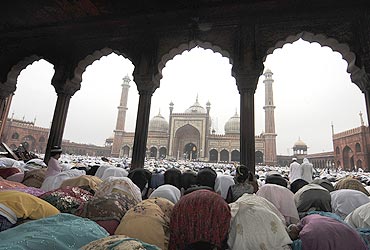
They question that in view of the larger acceptance of the verdict in the coming days, is it prudent at all to oppose the verdict and move towards more isolation of the community from mainstream India? On this point there are frantic deliberations going on to not fall into any trap that can take the community backward.
A senior analyst from the Muslim community told rediff.com, "The entire media and political leaders of the Congress were saying that India of 2010 is not the India of 1992. We think India of 2010 is worse than 1992."
A senior Muslim leader from the Gangetic belt of Uttar Pradesh said that after independence, "Due to this judgement, this is the first time we are directly pitted against a Hindu India."
The day after the judgment there is so much anger and anguish in the Muslim community that very few leaders are even coming before television cameras or talking on the record. One of the leaders said, "This is a repeat of our 1947 moment."
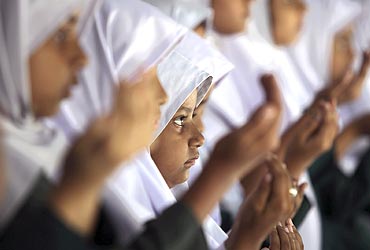
Kamal Farooqui, member of the All India Muslim Personal Law Board, told rediff.com, "This is the most crucial moment in the lives of the Muslim community, it will be difficult for me to say anything now. But, you may wait for some historical decision from our side."
He said, "We are telling the community to keep calm. We are telling them to apply their brain. Do not get emotional. We are, indeed, passing through tough times. We will have to be alert about our youth and we will meet soon to take a decision over the land given to us."
Farooqui, who was reluctant to speak freely, said, "If the leaders start speaking now then our youth will lose their faith in the judiciary, and we just can't afford it."
The historical decision that some radical Muslim leaders want to take will veer around the dismissal of the title suit of the Sunni Waqf Board by the court. The AIMPLB is the highest body that is ow likely to decide the next course of action after the judgment.
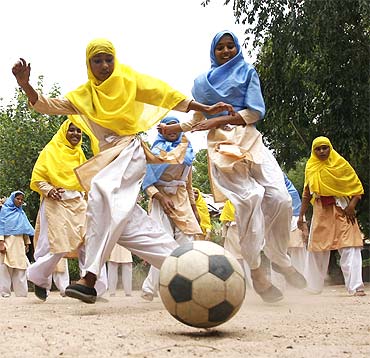
Owaisi said, "What perplexes us is that when two judges have stated that no temple was demolished, then why this judgment against us? I think this judgment has brought religion to the forefront in Indian minds. How can you sensibly deny that this judgment is not rewarding the people who demolished the Babri masjid? Which religious place, Hindu or Muslim, is now safe in India? Kashi and Mathura are now back in the news. With due respect to the court, I want to say that now, anybody can indulge in vandalism without fear of the court. The event of 1992 will become a precedent now."
He says anything can happen now inside religious places and anyone can go to court pleading that it's his community's matter of faith, and if he can prove people's faith in that particular spot of land he may get possession of the shrine.
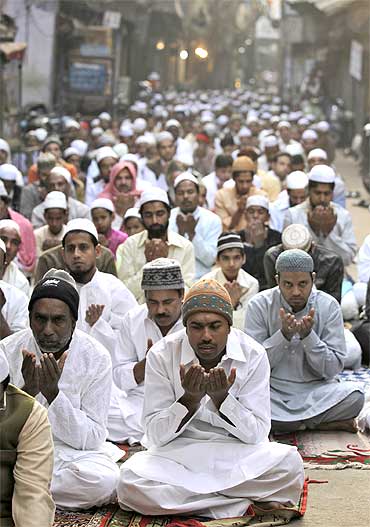
Owaisi says many Muslims feel that the Congress, which is carrying lots of baggage relating to the mosque, has failed them again. This has reopened the wounds of 1986, 1989 and 1992. "The sense of injustice that has crept in our hearts on September 30 will not go away soon. On top of it look at the debate in the public. The Bharatiya Janata Party is saying that Muslims should now come forward for a reconciliation. For what, bhai? Why should we be a secular coolie bearing the burden alone to ensure that India remains secular? I can only say that as a Muslim I feel something has been snatched away from me."
While echoing the emotions of the radical thinkers of his community, Owaisi said, "I am going to the extent of offering the entire land to Hindus. What more do you want from me? I think Muslims want the mosque back at the same place, or let the Hindus have their temple on the entire plot. Both the temple and mosque on the same plot is unacceptable."
He said, "Let me assure you, we won't go to the mosque or maulvis for fatwas in this direction. We shall wait for the verdict of the Supreme Court and if we lose there, then we won't take any charity. Let Hindus go alone and build the temple."